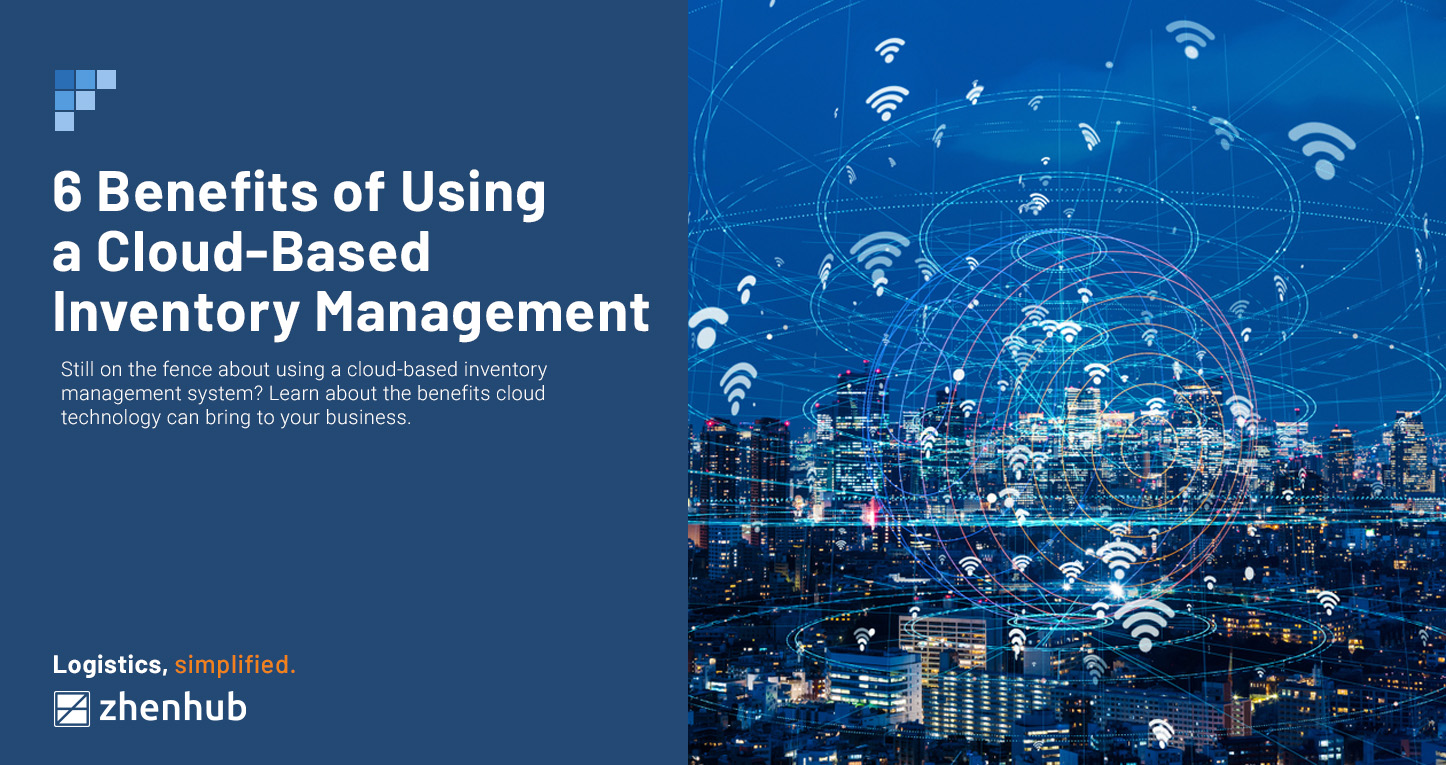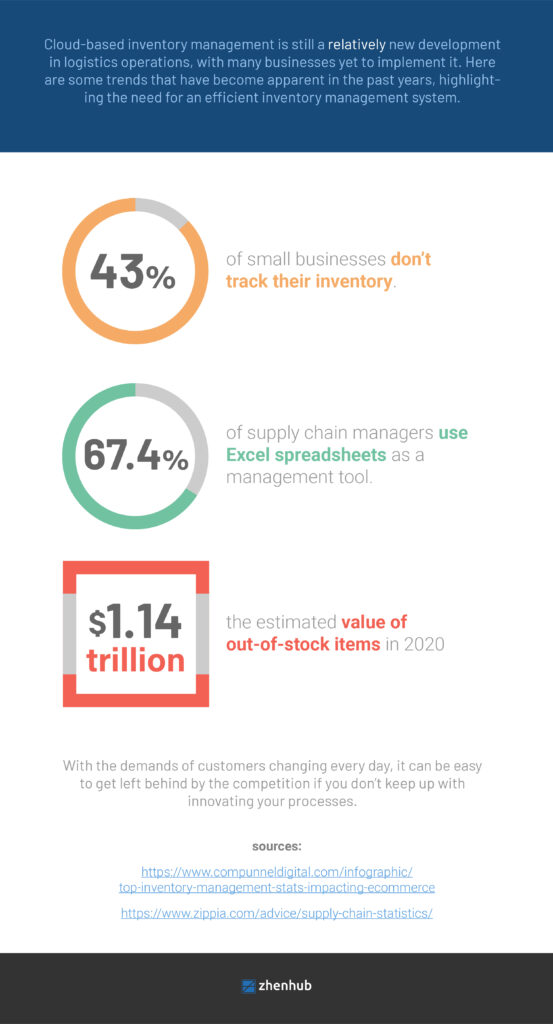
6 Benefits of Using a Cloud-Based Inventory Management
Time to read: 6 minutes
Inventory management is one of the more tedious and time-consuming aspects of running a business. Its repetitive nature can lead to costly human errors— a terrible headache to burden operations. The continuing pandemic struggle made it evident that as many as one-in-four employees want to quit their job because of flawed business processes. Manually checking inventory could divert precious resources hindering growth and sidetracking you from other opportunities.
However, you can’t avoid inventory management either. P Proper stock control can help generate a positive customer experience. Companies need to ensure items are in stock and ready to be delivered to keep customers happy and loyal. Proper management brings in more profits as well since you’ll always have the right amount to ship out. Stockpiling goods could result in high holding costs.
Cloud storage is already on the fast track to becoming the next big thing for any eCommerce business. Cloud technology essentially works as a virtual space on the internet that can hold large amounts of data, information, and applications. The best part is that it’s not limited to a physical space or location. You can access the data you store anytime on the cloudAll you need is a smart device and an internet connection.

Having a cloud-based inventory management platform can lead to incredible business growth and a much more efficient workforce. Discover the different benefits of this service and what you can do to get started in the article below.
How does Cloud-Based Inventory Management Work?
Cloud-based inventory management is a software as a service (SaaS) that offers businesses the ability to monitor and maintain their inventory levels online. Traditionally, companies would do this manually via pen and paper or Excel. While this setup can work for small businesses, bigger operations will find it increasingly difficult to set aside time for tracking.
Cloud inventory works by creating a centralized record of every asset. These records will also get automatically updated for every step of your fulfillment order,; from order creation to shipping, out all without the need for human input.
Typically inventory management software includes the following features:
- Order management
- Inventory tracking and locating
- Supplier communications
- Automated repair requests
- Cost optimizations
- Loss and theft prevention
Barcode scanners play an integral part in implementing a digital system by being easy to use and working fast. This is the transition point between physical items into tracking in the digital storage space.
For an eCommerce business, having this automated, cloud-based inventory management system helps you keep up with fast-paced customer demands and hyper-competitive marketplaces.
Why You Should Trust Cloud-Based Inventory Management
Having an accurate inventory means everything for a business. Among global mass merchants and grocery retailers in 2020, they reported a $176.7 billion value for overstocked items and $568.7 billion for out-of-stock goods.
Failing to keep an accurate record of your inventory can lead to delays in shipping, irregularities with restocking, and time-consuming tasks. All of these can impact your bottom line and leave a bad impression on your customers making repeat sales unlikely.
The good news is that cloud technology has reached a point where it offers greater functionality and data integrity than doing things manually. Implementing a cloud-based inventory management system helps your business scale better and operate more efficiently. Here are six great benefits that cloud-based inventory management has to offer:
1. Automated Processes
Cloud technologies help automate your supply chain without the need for any manual labor or input. These platforms will automatically update the data for your inventory counts, product tracking, and multi-channel routing. A centralized data source allows your system software to instantly pull all the necessary numbers and stocks, providing an accurate overview of your entire inventory. Automation helps streamline processes and free up your staff to focus on other tasks.
2. Real-Time and Remote Access
Compared to a logbook or an Excel sheet that you can only access in one place, cloud computing can immediately tell you how much stock you have, anywhere, anytime. This feature is incredibly useful for avoiding stock-outs. Efficiently manage stock levels between different warehouses, removing physical limitations such as distance and travel time. Decision-making can be made easier with real-time insights. Business owners can be alerted to sudden changes in warehouse inventory and act upon them immediately.
You can conveniently access this data with a smartphone or a laptop and an internet connection.
3. Avoid Costly Errors
Inventory management can get repetitive and tiresome. Someone will inevitably make a mistake doing tasks manually and trying to find where, when and who caused the error can take precious time. Incorrect information can be very costly. Relying on cloud technology can take the burden off manual checking and decrease error incidences.
The automated nature of cloud-based inventory management reduces human errors leading to more accurate reporting. A solid-built inventory management software will tell you if there are such errors, making corrections and revisions faster.
4. Integrations with Other Software and Apps
Many cloud-based inventory management software are compatible with other similar productivity apps. If you’ve already begun to digitize your supply chain, then integrating an inventory management program will be easy. Many multi-channel eCommerce platforms already have some form of inventory management, seamlessly forwarding data to order fulfillment apps and distribution software. As everything gets stored in the cloud, there’s no need to input data again. Once you connect them to your other management software, you’ll have immediate access to your inventory.
5. Safety and Security
Sensitive and valuable information is safe when stored online or in the cloud. Many providers have secure data servers protected against downtime and offer 24/7 support. These servers get constantly updated to defend against cyberattacks as well. Businesses won’t also have to worry about losing their data, as backups are created automatically whenever something is changed. There is also no need to maintain a physical server onsite.
This cloud feature is a big step from physical ledgers or data stored on physical hardware, which can be difficult to recover when lost or damaged. Data from the cloud can be resynced automatically from any device, from several points in time, should you need access to a specific edit or update. There will also be a digital paper trail showing you if a user made any changes or who has access to certain data.
6. Analytics for Inventory Forecasting
Make better data-informed business decisions with accurate information delivered to you in real-time. Get access to insights and analytics that reflect the performance of your business. You can track best-selling items and quickly tell you they are soft. Historical data shows you the bigger picture of your sales, allowing you to understand which items you can let go of and which to invest in.
Profitability is easy when you have the data to guide your decision-making.
Choosing the Right Cloud-Based Inventory Management
Not every cloud-based inventory management software is made equal. The best fit for your company is the technology that can adjust to your needs and not the other way around. Ease of set-up is essential, so you can take your business online as quickly as possible and enjoy all the benefits that cloud technology offers.
Consider these factors when selecting a software to invest in:
User Interface (UI)
Intuitive interface that is easy to understand and navigate. Plus points if it is easy to introduce to staff who aren’t proficient with data tools.
Usability
Look for a system that can accommodate massive amounts of SKUs, and products, while making them simple to look for and organize.
Integrations
Your chosen inventory management system needs to integrate with various eCommerce platforms, accounting software, ERP solutions, CRM apps, and marketing tools.
Value for money
A proven track record, customizability, and reliable support are all things to keep in mind, as you will want your investment to last you a long time.
Explore management solutions that specifically cater to your industry or niche. These may have functions and data algorithms better suited to support your operations.
Initiating growth is made easy with automated inventory management. Your warehouse can now manage more stock, meaning you can offer even more products for sale. Planning out expansions are hassle-free as you have the insights and data to support your future actions.
New technology is always on the horizon for the supply chain management. While there is absolutely nothing wrong with doing things manually and relying on physical hardware, you might find it challenging to keep up with competitors already ahead of the curve.
Moving your business to the cloud is cost-efficient, time-saving, and prepares you for bigger opportunities. For eCommerce retailers, this can mean shipping immediately from any online sales channel, printing waybills in bulk, and making the customer shopping experience more pleasant.
ZhenHub can help your eCommerce business maximize tech innovations. You can utilize our all-in-one digital platform where you have complete control and visibility over your stock movement and fulfillment operations. If you’re interested in our services, don’t hesitate to contact us or sign up; our team of experts is always ready to help.